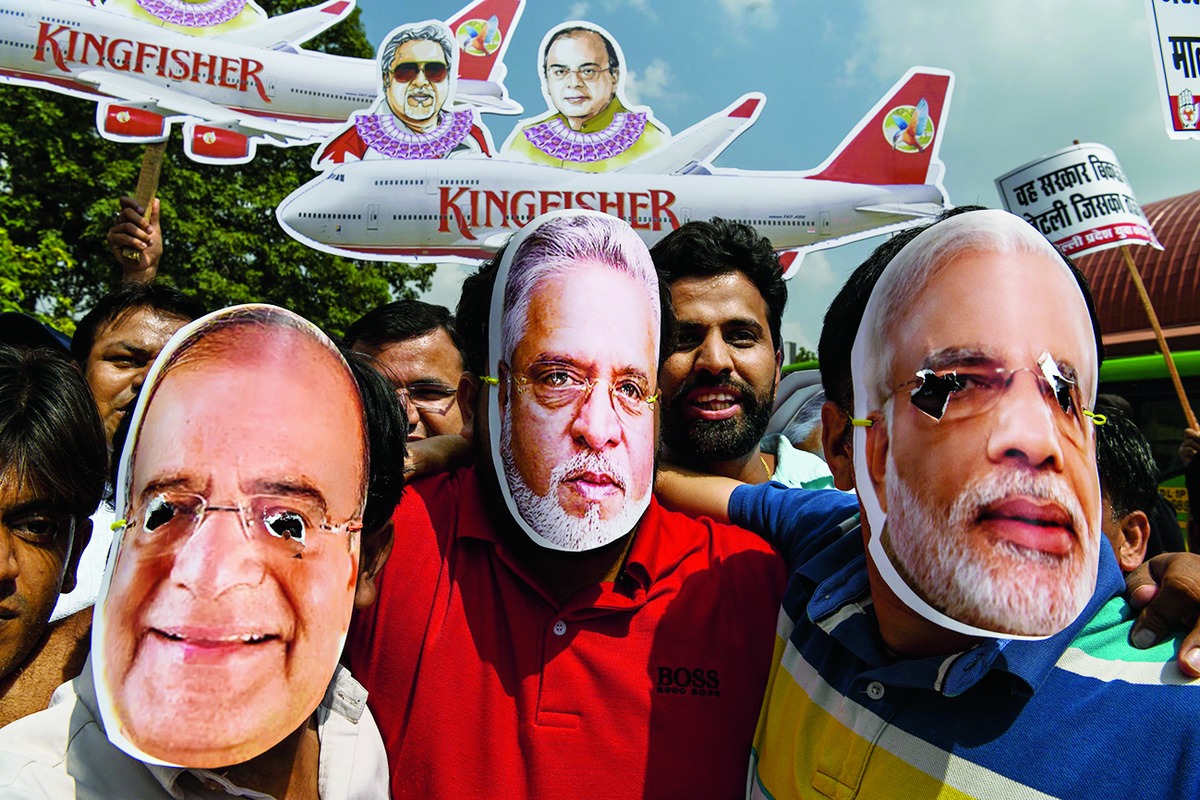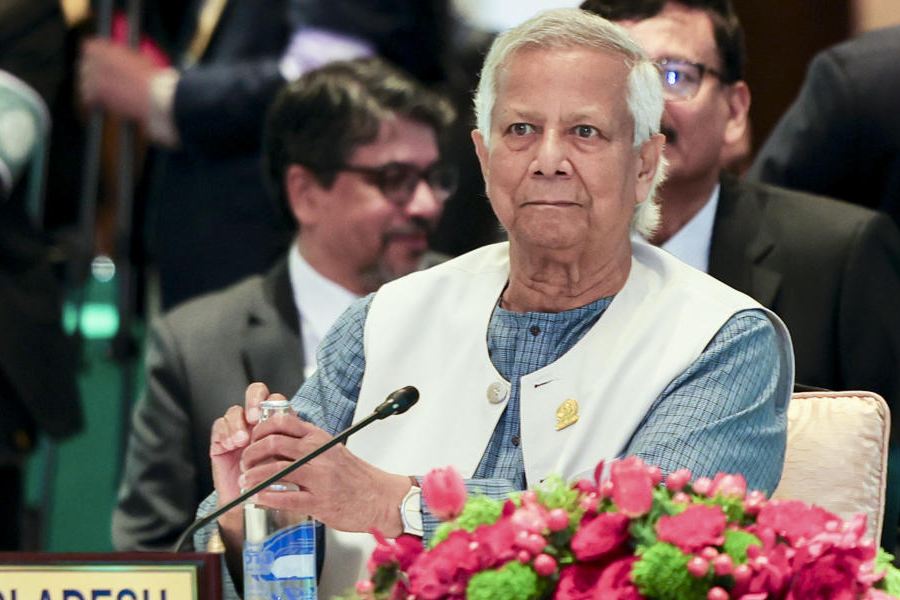
Arun Jaitley, widely regarded as the most articulate minister in the Narendra Modi government, added a strange phrase - "factually false" - to the nation's vocabulary last week.
The Union finance minister's play with words came in response to a statement made in London on September 12 by fugitive liquor baron, Vijay Mallya, who is facing charges of unpaid debts, fraud and money laundering amounting to over Rs 9,000 crores. Taking a nicotine break outside the London court which is hearing the case seeking his extradition to India, Mallya told reporters, "I met the finance minister before I left, repeated my offer to settle with the banks. That is the truth."
The allegation that Mallya had met Jaitley the day before he left India on March 2, 2016 had been made by Congress leaders back then itself. The Mallya case created a storm in Parliament too. Throughout that period, Arun Jaitley kept silent on the matter. But Mallya's comment last Wednesday forced Jaitley to react. It was, he said, "factually false in as much as it does not reflect truth."
But if Mallya's statement is "factually false", Jaitley's own statement is factually economical - in as much as it does not throw light on a great many mysteries swirling around his encounter with the absconding tycoon.
Jaitley claims that he had never given Mallya "any appointment" and so "the question of his having met me does not arise". And then contradicts this by confirming that a meeting did indeed take place.
According to Jaitley, since Mallya was a member of the Rajya Sabha and "he misused the privilege on one occasion while I was walking out of the House to go to my room. He paced up to catch up with me and while walking uttered a sentence that 'I am making an offer of settlement.'"
Jaitley goes on to say: "Having been fully briefed about his earlier 'bluff offers', without allowing him to proceed with the conversation, I curtly told him 'there was no point talking to me and he must make offers to his bankers.' I did not even receive the papers that he was holding in his hand."
Back in London, Mallya was unfazed by Jaitley's so-called denial - because the denial had only confirmed that the two had met. Mallya had not spoken of any "appointment" with Jaitley in the first place. When reporters asked him for a clarification, he corroborated what Jaitley had said - with an additional tantalizing detail.
In his second encounter with the media, Mallya said: "I happened to meet Mr Jaitley in Parliament and I told him that I was leaving for London and that I want to settle with the banks and would he please facilitate a discussion. I did not have any formal meeting scheduled with him."
Mallya's second sound bite was even more lethal. He revealed that he had informed the Union finance minister that he was leaving for London - a claim that has not been contested by Arun Jaitley so far.
But forget Jaitley's silences. It is his statement that raises more questions than it answers. It says that on "one occasion" Mallya caught up with him inside Parliament, sidestepping the fact that the encounter took place on March 1, 2016, the day before Mallya fled the country.
Jaitley confirms that Mallya sought his intervention but claims he curtly told him to talk to his bankers. This bit of information is particularly startling in view of the facts that came into the public domain soon after.
After dragging its feet for several months, the consortium of banks led by the State Bank of India to which Mallya owed thousands of crores finally decided to act in late February. Fearing that Mallya might flee the country, top officials of the SBI sought legal advice from the senior lawyer, Dushyant Dave, on February 28. Dave advised the bank to approach the Supreme Court the very next day to get an order restraining Mallya from leaving the country.
Dave has since revealed that "the SBI chairperson and people at the top within the government knew about this meeting and the advice given by me. However, there was no action taken on it."
When Mallya met Arun Jaitley in the corridors of Parliament, Jaitley must have been aware of the February 28 meeting. He must have also known that the consortium of banks had decided to move the debt recovery tribunal against Mallya. It is mystifying, therefore, why the finance minister asked Mallya to make "offers to his bankers". Or why Jaitley did not use his formidable powers to alert the authorities to prevent Mallya from leaving the country the next day.
The Central Bureau of Investigation has come under a cloud for changing its look-out notice - first asking the immigration authorities in October 2015 to "detain" Mallya if he tried to leave the country and a month later asking them to merely "inform" it of his movements. The CBI has defended the dilution on the grounds that Mallya had been cooperating in the investigations and had flown in and out of the country a few times in between.
But by March 2, time was running out for Mallya. If there had been a little more coordination between different wings of the government, the CBI could have stopped him from leaving. The very opposite happened: the banks for some mysterious reason decided not to move the Supreme Court on February 29; Mallya met Jaitley in Parliament on March 1; he left the country on March 2; the banks moved the debt recovery tribunal the same day; and on March 8, the banks "urgently" appeared before the apex court seeking to restrain Mallya, a week after he had departed with aplomb (checking in, reportedly, 54 pieces of baggage).
The government is now making strenuous efforts to get Vijay Mallya back. Whether it succeeds or not, the manner of his departure indicates a level of collusion that makes a mockery the Narendra Modi regime's claim of running a transparent, scam-free government.
The Jaitley-Mallya encounter, in fact, is not a one-off case. In June 2015, another London-based fugitive's links with a Union minister led to the washout of the monsoon session of Parliament. The British newspaper, Sunday Times, first broke the story that Indian origin member of parliament, Keith Vaz had asked the country's immigration department to provide travel documents to the disgraced cricket administrator, Lalit Modi, since his Indian passport had been revoked. Vaz cited a request of the Indian external affairs minister, Sushma Swaraj, in the matter.
Just as Jaitley confirmed his meeting with Mallya two-and-a-half years after the encounter, Swaraj belatedly confessed that she had helped Lalit Modi - in spite of the fact that he was a wanted man in India. Sushma said she had done so on "humanitarian" grounds to help Modi travel to Portugal where his wife was undergoing surgery. Lalit Modi boasted that he had "a very close relationship" with the Swaraj family: Sushma's husband was his lawyer. Lalit Modi also confirmed that the Rajasthan chief minister, Vasundhara Raje, had signed the original papers in support of his immigration to the UK.
If London is the common link in the revelations on Jaitley and Swaraj, there is an uncanny resemblance between the "wise after departure" stance taken by banks in the cases of Vijay Mallya and Nirav Modi. Replies to Parliament have confirmed that the Prime Minister's Office had been alerted about the Punjab National Bank fraud as far back as 2016. Nirav Modi and his uncle, Mehul Choksi - accused in the Rs 13,500 crore PNB scam - also figured in the list of high-profile fraud cases submitted by the governor of the RBI to the PMO that year.
Yet, no action was taken against the businessmen who fled the country in early January 2018. Such was their sense of impunity that Nirav Modi posed for a group photograph with the prime minister, Narendra Modi, at the World Economic Forum in Davos on January 23. Six days later, the PNB sent its first complaint against Nirav Modi and Mehul Choksi to the CBI - which dutifully issued a look-out notice and registered an FIR well after the duo ensconced themselves in safe havens abroad.
Taken together, Vijay Mallya's casual mention of his meeting with the finance minister, Lalit Modi's brazen boast of close links with the external affairs minister, and Nirav Modi's easy access into a frame with the prime minister point to a new phenomena. Crony capitalists are passé. We are now in the era of crony fugitives...











